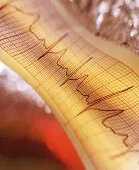Study of men highlights importance of seeking medical help for chest pain, shortness of breath
WebMD News from HealthDay

By Barbara Bronson Gray
HealthDay Reporter
TUESDAY, Nov. 19, 2013 (HealthDay News) -- A new study counters the commonly held belief that when most middle-aged men suffer cardiac arrest, it typically comes completely out of the blue.
Researchers found that the majority of victims have symptoms in the days and weeks before the emergency.
Most had chest pains between four weeks and one hour before a sudden cardiac arrest -- when the heart stops abruptly -- the study found. Others had noted shortness of breath, while a small percentage experienced dizziness, fainting or heart palpitations.
The study authors said that although middle-aged people are considered to be in the prime of life, they are not immune to cardiac emergencies.
"At least a third of cardiac arrests in men are happening in middle age," said study lead author Dr. Sumeet Chugh, a cardiologist at Cedars-Sinai Medical Center in Los Angeles.
The recent death of The Sopranos star James Gandolfini at the age 51 highlighted the fact that sudden cardiac arrest can affect relatively young people.
The study was scheduled for presentation Tuesday at the annual meeting of the American Heart Association, in Dallas.
Sudden cardiac arrest occurs when the heart suddenly starts beating either very quickly and erratically, or extremely slowly, due to a failure of its electrical system, said Dr. Gregg Fonarow, a cardiologist at the University of California, Los Angeles. "That's different than a heart attack, where there is a blockage that injures the muscle," he said.
About 360,000 out-of-hospital cardiac arrests are reported each year in the United States, according to the American Heart Association. Less than 10 percent of those who have a cardiac arrest outside the hospital survive.
For the study, the scientists focused on the population of Portland, Ore., assessing every man between the ages of 35 and 65 who had a sudden cardiac arrest within a period of almost 12 years. Of the more than 800 total cases, 31 percent of the medical records did not have enough information to identify whether symptoms were present before the attack.
The researchers also reviewed the accounts of family members, witnesses, emergency medical personnel and medical records from the time period around the cardiac arrest.
In the remaining cases, 53 percent had symptoms that ranged from episodes of chest pain to feeling like they had the flu.
Although the data helps point to the importance of recognizing symptoms and seeking help, Chugh said, there are still more questions than answers. For many people with early symptoms of potential heart problems, doctors' exams may not show anything definitive.
"We're trying to improve the scope of a complete [cardiac] work-up, but there are big gaps in what we know," Chugh said. "What happens in the hour before cardiac arrest? What about in the 24 hours before, the week before or the month before?"
source : Sudden Cardiac Arrest May Have Early Warning Signs








